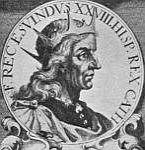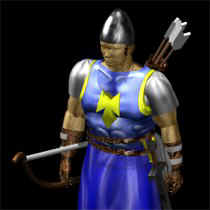7




















| Thumbs Up |
| Received: 35,741 Given: 17,041 |

Tartessian, Europe’s newest and oldest Celtic language
Source: http://www.historyireland.com/pre-hi...ltic-language/
The south-western Iberian Peninsula at the horizon of history. There are at least 90 known Tartessian inscriptions on stone concentrated in southern Portugal, with a wider scatter of fifteen over south-west Spain. (J. Koch, An atlas for Celtic studies (Oxford, 2008))
John Koch suggests that Tartessian is ‘more than a little bit Celtic’ and adds a new twist to the assertion, long since dismissed as invention, that the Gaels (Milesians) originated in the Iberian Peninsula.
The myth and mystery of Tartessos
For Greek and Roman writers, Tartessos was a place of fabulous natural wealth in silver and gold, situated somewhat vaguely in Europe’s extreme south-west, beyond the Pillars of Hercules. When Herodotus, ‘the father of history’, wrote around 430 BC, the kingdom of Tartessos had already ceased to exist and belonged to the pre-classical past before the rise of Cyrus the Great and the Persian Empire. The power exerted by the idea of Tartessos on the classical imagination was such that many of the exploits of Hercules—originally set in the eastern Mediterranean—were relocated to the fabled country beyond the Straits of Gibraltar, hence called the Pillars of Hercules. Though there is more than one school of thought on the subject, a long-standing and prevalent view is that the ocean-going, luxury-laden ‘ships of Tarshish’ mentioned repeatedly in the Old Testament—going back to the joint venture of Solomon and Hiram I of Tyre around 950 BC—also refer to Tartessos.
Archaeologically, Tartessos is synonymous with the brief and spectacular ‘orientalising phase’ of the south-western Iberian Peninsula’s First Iron Age, around 750 to 550 BC. At this time the Phoenician colony of Gadir, now Cįdiz on Spain’s south Atlantic coast, catalysed a brief incandescent hybrid civilisation in what had been the southern region of the Atlantic Late Bronze Age (around 1250–750 BC). That earlier cultural commonality, defined by bronze swords, spearheads, cauldrons, flesh-forks and spits, stretched from Tartessos to Galicia, Brittany, Britain and Ireland. In the eighth century BC a new élite arose rapidly amongst the native trading partners of the Phoenicians. These Tartessian potentates are known primarily from necropolises of tumulus burials, awash with luxury grave-goods from the eastern Mediterranean, including jewellery, cosmetics, portable images of deities, ornamented chariots, wine and oil.
Soon after Gadir’s mother city, Tyre in present-day Lebanon, fell to Babylon in 573 BC, the Tartessian élite’s economic lifeline to the east became rapidly constricted, and the wealthy burials came to an end. Herodotus wrote that a party of Greeks from Phocaea in western Asia Minor visited Tartessos around 550 BC, where they received enthusiastic hospitality and vast riches from the Tartessian ruler Arganthonios, in whose name we may recognise the Celtic word for ‘silver’, Irish airgead, Welsh arian, ancient Celtic arganto-. Arganthonios was understandably eager for the Phocaeans to found a colony ‘anywhere they liked on his land’. But the Greeks were not to save Tartessos. Around 540 Phocaea fell to Cyrus. Soon after, when Arganthonios was dead, the remaining Phocaean fleet in the west was destroyed by a combined Etruscan–Carthaginian force off Alalia in Corsica. The Straits of Gibraltar were henceforth closed to Greek shipping. During the fifth century BC, the Iberian culture of Spain’s Mediterranean coast—which had ongoing access to Greek and Carthaginian trade—was to supplant Tartessos as the wealthiest and most dynamic zone of the peninsula.
Tartessian inscriptions
One of the enduring consequences of the era of Phoenician influence—which had by around 800 BC progressed from trading outposts to full-blown colonies in southern Spain—was the adoption of alphabetic writing by the native population, first in the south-west. The number of known Tartessian inscriptions on stone is now about 90 and steadily rising with new discoveries. Concentrated densely in southern Portugal (the Algarve and Lower Alentejo), there is a wider scatter of fifteen over south-west Spain. The best exhibition of the inscriptions is on view in the new and innovative Museu da Escrita do Sudoeste, in the charming provincial town of Almodōvar. In the significant minority of cases in which the stones have been discovered in their original context and this has been published, the find-spots are necropolises of the Iberian First Iron Age (800–500 BC), showing that the inscriptions belong to a funerary tradition. In this respect they continue the 100 pre-literate ‘warrior stelae’ of the Iberian Final Bronze Age (1250–750 BC). In four apparently transitional monuments incised heroic images are combined with Tartessian texts.
The oldest Celtic language?
Thus far, the theory that Tartessian is partly or wholly Celtic has been advanced only with an understatement and tentativeness that has failed to break through the habitual inattention of Celtic scholars in Ireland, Britain and North America towards evidence emerging in the Iberian Peninsula. Most Celticists know that the Celtiberian language of the eastern Meseta during the last centuries BC was Celtic and that there were also numerous ancient Celtic place- and group names in the western peninsula (e.g. names ending in –briga ‘hillfort’ = Old Irish brķ ‘hill’, for example). But that’s about as far as it usually goes.
When we approach Tartessian from the study of the better-attested Celtic languages—of Ireland and Britain and ancient Celtic Europe on the other side of the Pyrenees—it looks more rather than less Celtic. We have already noted Arganthonios, silver magnate in name and deed. Herodotus also mentions the Kune-tes, inhabitants of the Algarve, ‘the westernmost people of Europe’ and neighbours of the Keltoi (Celts). Their name appears to contain the Celtic word ‘hound’, hence ‘warrior’, ‘hero’ (for example, Cś Chulainn), and precisely the suffixed form in the Old Welsh Cinuit of the Kynwydyon (Brittonic Cune-tio, Cune-tiones), founder of the main dynasty of Strathclyde.
Turning to the inscriptions, some obstacles and uncertainties in the transcriptions remain. The list of recognisable Celtic-looking forms can be greatly extended, however. Particularly in the longer, unbroken and most legible inscriptions, something of a critical mass develops, in which the Celtic-looking words are so frequent that the theory of ‘a few Celtic names in a matrix of an unknown language’ must be rejected in favour of the new working hypothesis: ‘Tartessian is Celtic’. The Celtic look-alikes are eminently appropriate. For example, five of the letter sequences in the inscriptions resemble words in other Celtic languages meaning ‘grave’, ‘funerary monument’ or ‘build a funerary monument’. In the examples below, the compared words are Modern Irish if not otherwise labelled. The translations are mine and tentative.
Read more here: http://www.historyireland.com/pre-hi...ltic-language/













| Thumbs Up |
| Received: 128 Given: 94 |

Interesting! I always thought them to be an isolate. Thanks for sharing.


















| Thumbs Up |
| Received: 1,613 Given: 356 |

Kazimiera you just otworzyl puske pandoreDzieki wielki!


















| Thumbs Up |
| Received: 1,613 Given: 356 |

















| Thumbs Up |
| Received: 37,278 Given: 39,691 |

No. The 'lost city of Atlantis' was created by Plato as an analogy. We have the extant texts he wrote. It's like looking for Hogwarts. Genuinely. It's not real, it never was real, it's pure romanticism and fantasy and none of the theories will ever prove to be true as they're looking for something that doesn't exist and never has.
Who is rich? He who is happy with what he has - Simeon ben Zoma, Ethics of the Fathers, Talmud, Avot 4:1
I live here. I also live here.
Europeans worldwide * Longbowman's family on 23andme * Classify Longbowman * Ask Longbowman anything


















| Thumbs Up |
| Received: 1,613 Given: 356 |

dupped


















| Thumbs Up |
| Received: 1,613 Given: 356 |

I sense butthurt in the airLook it's ok, Atlantis was another (Greek) name for Biblical Tarsis which was another name for Tartessos. Civilization collapsed before the arrival of the Romans . They kind of are the "Mayans" of Iberia. They traded profusely with Phenitians and Egiptians and were the most ancient "advanced" civilisation of the European West , contemporary or even predating the earliest forms of Greek civilisation. At their peek they were probably a nice little ancient civilisation, rich in metals, and knowledgeable in math and astronomy.
Their realm was likely a loose federation of (small) city-states a la mesopotamian with a stronger figure that served as a nexus and was perceived by others as a King/Emperor without necessarily sharing the same characteristics of other early kings. We don't know much about their language, but we know that after the collapse of tartessos, probably due to a mixture of climate change (the area they inhabited became marshlands, and it was also an important era of seismic activity in the Mediterranean, with events such as the Santorini explosion probably causing tsunamis all over the place, and causing a domino reaction of natural disasters that some people wrote down as "the plagues" sent by god etc.
So climate change, disease, and probably the opening of new trade posts in the Spanish levant , much closer to the rising "Greeks" helped with de decline and abandonment of settlements. There's also the "Sea Peoples" possible effect added upon all of that.These Atlantean/Tartessians didn't go too far though, they moved along the edges of the marshlands founding new towns or adding up to the existing ones and )joined their "off-shot" brothers, the Turdetani (who are one of the direct descendants od Southern Iberians

















| Thumbs Up |
| Received: 37,278 Given: 39,691 |

Atlantis (Ancient Greek: Ἀτλαντὶς νῆσος, "island of Atlas") is the name of a fictional island mentioned within an allegory on the hubris of nations in Plato's works Timaeus and Critias, where it represents the antagonist naval power that besieges "Ancient Athens", the pseudo-historic embodiment of Plato's ideal state (see The Republic). In the story, Athens was able to repel the Atlantean attack, unlike any other nation of the (western) known world,[1] supposedly giving testament to the superiority of Plato's concept of a state.[2][3] At the end of the story, Atlantis eventually falls out of favor with the gods and famously submerges into the Atlantic Ocean.
Who is rich? He who is happy with what he has - Simeon ben Zoma, Ethics of the Fathers, Talmud, Avot 4:1
I live here. I also live here.
Europeans worldwide * Longbowman's family on 23andme * Classify Longbowman * Ask Longbowman anything
There are currently 1 users browsing this thread. (0 members and 1 guests)
Bookmarks